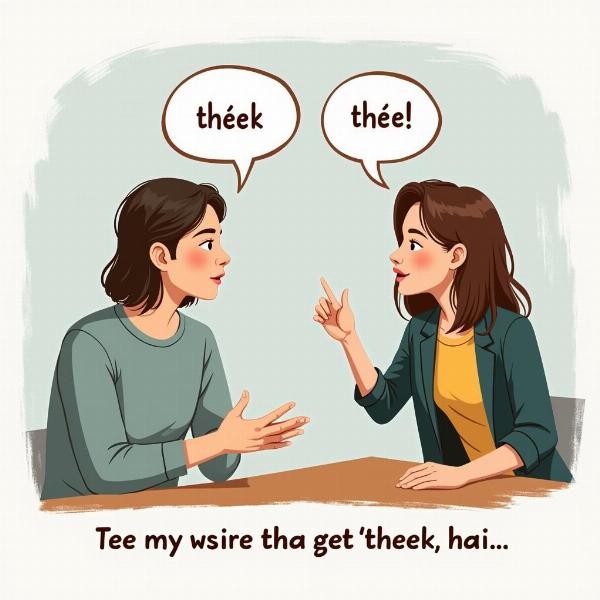Understanding the nuances of expressing agreement in Hindi can be tricky. “You are right hindi meaning” encompasses various phrases, reflecting the richness and politeness inherent in the language. Whether you’re a language learner, a traveler, or simply curious about Indian culture, this guide will explore different ways to say “you are right” in Hindi, delving into their contextual usage and cultural implications.
Different Ways to Say “You Are Right” in Hindi
Hindi offers a spectrum of expressions to convey agreement, ranging from formal to informal and from simple to emphatic. Let’s explore some of the most common ones:
-
आप सही हैं (aap sahi hain): This is the most common and versatile way to say “you are right.” It’s respectful and suitable for most situations, whether you’re talking to a friend, family member, or someone older.
-
आप ठीक कहते हैं (aap theek kahte hain): This translates to “you say correctly” and emphasizes the correctness of the other person’s statement. It’s often used in discussions or debates.
-
हाँ, आप सही हैं (haan, aap sahi hain): Adding “haan” (yes) at the beginning reinforces the agreement and adds a touch of enthusiasm. This is similar to saying “yes, you are right” in English.
-
बिल्कुल सही (bilkul sahi): Meaning “absolutely right,” this expression conveys strong agreement and certainty. It’s ideal for situations where you wholeheartedly agree with the other person.
-
सही बात है (sahi baat hai): This translates to “it’s the right thing” or “true talk.” It acknowledges the truth or validity of the statement.
-
ठीक है (theek hai): While literally meaning “okay,” this phrase can also be used to express agreement, especially in informal contexts. It’s less emphatic than the other options.
 Two people having a conversation in Hindi, one agreeing with the other.
Two people having a conversation in Hindi, one agreeing with the other.
Cultural Context and Politeness
Indian culture places a high value on respect and politeness, especially towards elders and authority figures. Choosing the right expression to convey agreement is crucial for maintaining social harmony. While “theek hai” is acceptable among friends, using more formal phrases like “aap sahi hain” is essential when addressing elders or superiors.
Choosing the Right Expression
The best way to say “you are right” depends on the context and your relationship with the other person. Consider the formality of the situation, the age and status of the person you’re talking to, and the level of emphasis you want to convey.
Common Questions about “You Are Right” in Hindi
How do I say “you are absolutely right” in a formal setting?
In a formal setting, “aap bilkul sahi hain” (आप बिल्कुल सही हैं) is the most appropriate way to say “you are absolutely right.”
Is it okay to use “theek hai” with elders?
While not disrespectful, using “theek hai” with elders might be perceived as too casual. Opting for a more formal expression like “aap sahi hain” is generally recommended.
What is the difference between “aap sahi hain” and “aap theek kahte hain”?
“Aap sahi hain” simply means “you are right,” while “aap theek kahte hain” emphasizes the correctness of the other person’s statement, similar to “you say correctly.”
“You are Right” in Different Scenarios
Imagine you’re traveling in India and someone gives you directions. Saying “aap sahi hain” (you are right) shows your understanding and appreciation. In a business meeting, using “aap theek kahte hain” (you say correctly) can acknowledge a colleague’s point.
Conclusion: Navigating the Nuances of Agreement
Mastering the various ways to say “you are right” in Hindi is essential for effective communication and building strong relationships. By understanding the nuances of each expression and their cultural implications, you can navigate social interactions with grace and confidence. Remembering the context and choosing the right phrase will not only make your conversations smoother but also demonstrate your respect for Indian culture.
FAQs:
- How do I pronounce “aap sahi hain”? The pronunciation is approximately “aap suh-hee hain.”
- Can I use “sahi baat hai” in any situation? Yes, it’s generally suitable for most informal situations.
- Is there a slang way to say “you are right” in Hindi? While slang exists, using respectful language is generally recommended.
- What if I accidentally use the wrong phrase? Most people will understand your intent, but learning the correct usage demonstrates respect.
- Where can I learn more about Hindi expressions? Meaning-Hindi.in offers a wealth of resources for learning Hindi.
- Is Hindi difficult to learn? Like any language, it requires effort, but with practice, you can become proficient.
- What are some other useful Hindi phrases? Learning greetings like “Namaste” and “Dhanyavaad” (thank you) is a great start.
Meaning-Hindi.in is your trusted partner for all your Hindi translation needs. We offer a wide range of services, from business and legal document translation to website localization and technical manuals. Our team of expert linguists ensures accurate and culturally sensitive translations. Contact us today at [email protected] or call us at +91 11-4502-7584. Meaning-Hindi.in is dedicated to bridging the language gap and facilitating seamless communication. Whether you need help with legal documents, technical manuals, or marketing materials, our expert translators can help.